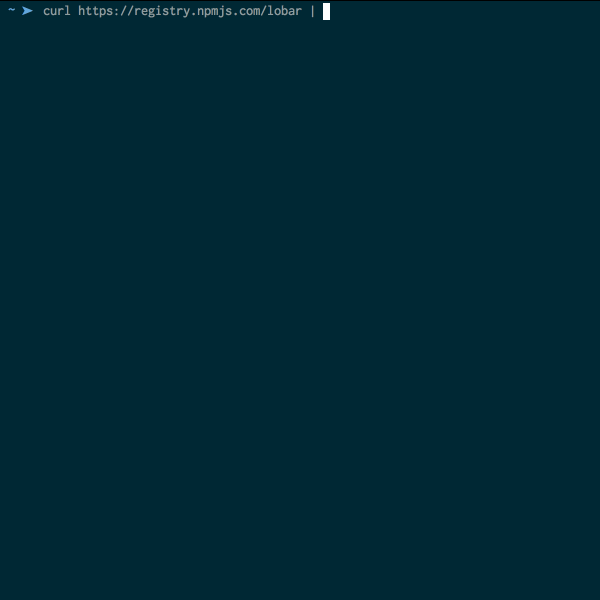lobar
v0.9.5
Published
A thin shell wrapper for lodash.chain()
Downloads
20
Maintainers
Readme
lobar
A thin shell wrapper for lodash.chain().
install
> npm install -g lobarusage
> lbr -h
Usage: lbr <JSON> <method> <arg> [method arg, ...] [options]
Options:
-d, --data <required> input json [string]
-f, --filename <required> input json file [string]
-v, --verbose verbosity level [count]
-p, --prettyPrint pretty print output [boolean]
-i, --interactive interactive mode [boolean]
-h, --help Show help [boolean]
-V, --version Show version number [boolean]
Examples:
lbr -d '["foo"]' map upperCase ["FOO"]
echo '{"foo": "bar"}' | lbr get foo "bar"
echo '{"foo": "bar"}' | lbr .foo "bar"pipe
$ echo '[{"foo":"bar"}, {"foo":"baz"}]' | lbr map foo
> ["bar","baz"]You also have access to lodash methods inside of the method calls:
$ echo '[{"foo":"bar"}, {"foo": 3}]' | lbr filter 'x => isString(x.foo)'
> [{"foo":"bar"}]shorthands
A leading . on an argument is shorthand for get:
$ echo '{"foo": {"bar": "baz"}}' | lbr .foo.bar
> "baz"is equivalent to:
$ echo '{"foo": {"bar": "baz"}}' | lbr get foo.bar
> "baz"interactive mode
$ curl https://registry.npmjs.com/lobar | lbr -i
vi keybindings
Interactive mode has basic vi keybindings. It starts in insert mode.
autocompletion
In insert mode, lobar will try to infer methods or argument from method/arg
position and evaluated JSON at the current cursor position. <Tab>/<S-Tab> or
<C-n>/<C-p> to navigate the completion list.
normal mode
Hitting esc will drop you into normal mode, where you can move horizontally
with h, l, b, w, e, t, f, T, F, 0, and $. You can also use
c and d with those movements in addition to i and a with a character or
one of {}[]{}'". Vertical movement ('j', 'k', <C-d>, <C-u>), will scroll the
json output.
u to undo and <C-r> to redo.
y will copy your current prompt input to your clipboard.
<C-c> to exit or enter to exit and print the currently evaluated json to
stdout.
caveats
If you want to use a string argument for a method that collides with a lodash method name, you'll have to quote it twice:
echo '[{"isString": true}]' | lbr filter "'isString'"
[{"isString":true}]This is because lbr tries to eval the argument with lodash as the context.
echo '[{"isString": true}]' | lbr filter isString
[]environment variables
You can set options using environment variables:
$ LOBAR_PRETTY_PRINT=true lbr -d '{"foo": "bar"}' .foo
> "bar"why?
I really like jq, but I have to look up the syntax all the time. As a javascript developer, I already know lodash, and it's generally enough for what I want to do at the command line.
TODO
- interactive mode
- history
- commands:
- R
- tests
